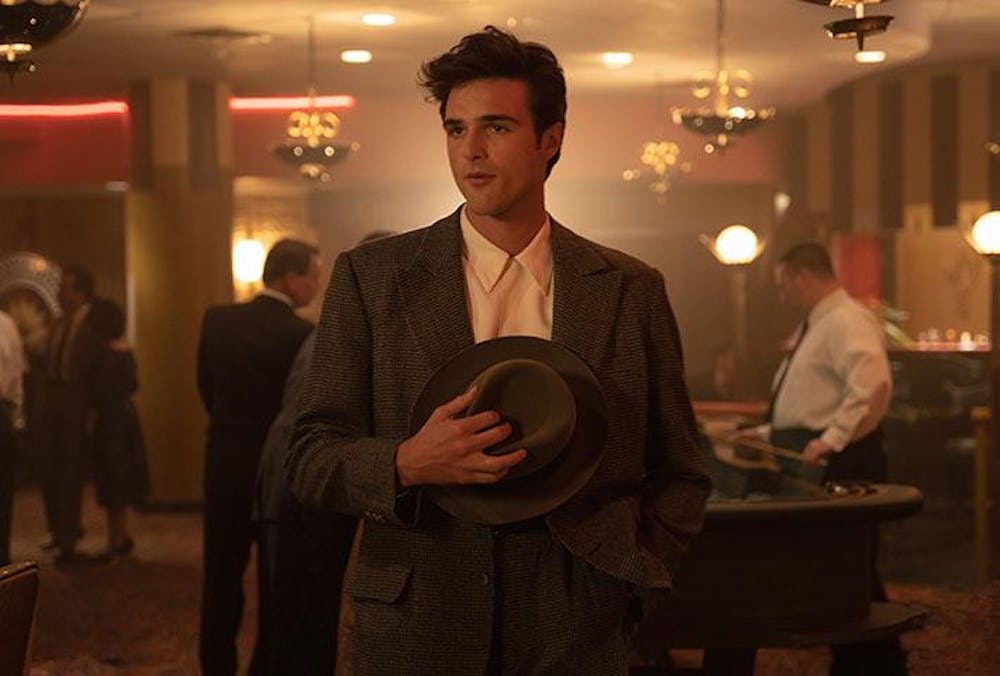Two minutes into “On Swift Horses,” a shirtless Julius (Jacob Elordi) asks for a cigarette. For the rest of the movie, not much changes: Elordi is seen in highly exposed orange mood lighting, either smoking, ashing, lighting or putting out a cigarette. This makes him irresistible to Muriel (Daisy Edgar-Jones), who also likes cigarettes and gambling. The two explore their sexuality behind the back of Julius’s all-American brother Lee (Will Poulter), who is Muriel’s soon-to-be husband.
Brown’s Ivy Film Festival screened “On Swift Horses” as part of their 24th annual festival.
The film is directed by Daniel Minahan’s second solo film project, following a long career directing hit TV shows including “Game of Thrones,” “House of Cards” and “True Blood.” “On Swift Horses” was adapted from Shannon Pufahl’s 2019 novel of the same name.
Skipping in time, Muriel and Lee, now married, live in San Diego. Muriel’s blue pencil skirt and sunglasses pop with the film’s saturated cinematography. Working as a waitress and using her tips to bet on horse races, she hides the money she makes from Lee. Meanwhile, Julius moves to Las Vegas to make it big. There, he meets Henry (Diego Calva), and the two promptly fall in love. Together, they make money by cheating casinos, and they frequently make out in a motel room during golden hour. But Julius and Muriel keep writing to each other, keeping the flame alive despite their long distance.
Together, Julius and Lee live opposite versions of the American experience. Lee seeks to build the image of stability and family that he never had as a child, while Julius wants to stay free-wheeling in the lust and glamor of Sin City, free from heteronormative constraints.
Meanwhile, Muriel is trying to free herself from the shackles of normal society. She makes her own money and, like Julius, works up the courage to love who she wants, including her edgy but warm neighbor Sandra (Sasha Calle). With the introduction of Calle’s character, the film gently explores the political undertones of American expansionism, as Sandra tries to gain signatures to stop a freeway from running through her property.
Almost everything in “On Swift Horses” is just good enough — maybe even too good. The shots are symmetrical, the subjects are centered and the lighting makes even the background set objects look beautiful. The actors deliver acceptable performances, and they’re all conventionally attractive. But because of this near perfection, it is almost impossible to forget the fact that you are watching a movie, and while the film alludes to social commentary about sexuality and the nature of America, it is unable to commit to this complexity.
Lee flip-flops between being bigoted and tender, but instead of building a complex character, the film simply uses his traits for the convenience of the plot. When the film wants the audience to laugh at Muriel’s infidelity, he is mean. But when the movie wants the audience to believe the couple has enough chemistry to exist, his character turns nice.
Julius is deep and misunderstood but is able to pouty-face his way out of every problem he faces. Muriel is supposed to fear loneliness, but this never causes conflict because she always has at least two people in love with her during the film.
At one point, a poignant scene endeavors to explore sexuality in America, with a gay bar turning off its lights because the police are outside. But the “coast is clear” within four seconds, and the film never truly dives into the difficulties of being queer in 1950s America. Viewers also never see the consequences of Sandra not getting enough signatures to save her house. Rather, her biggest concern is that Muriel is toying with her then going home to her husband.
The standardized dialogue was frustrating in itself. Characters utter revealing-yet-banal lines — “You see right through it all,” or, “He’s not like us.” The characters’ dialogue should drive these characters while they fall in love and face the all-encompassing difficulty of living in a world that they don’t fit into. Instead, their words are just lines that almost anyone could say to anyone else.
The frequent moments of onscreen intimacy prompted laugher from the IFF audience, but the constant, unintentional awkwardness pulled viewers out of the serious moments of the film, dampening the power these scenes should hold. Instead of truly exploring American culture and society, “On Swift Horses” relies on sensational scenes and cinematography to carry it through.
The first thing heard after the movie ended at this early screening was an unknown viewer asking, “What the fuck was that?”





